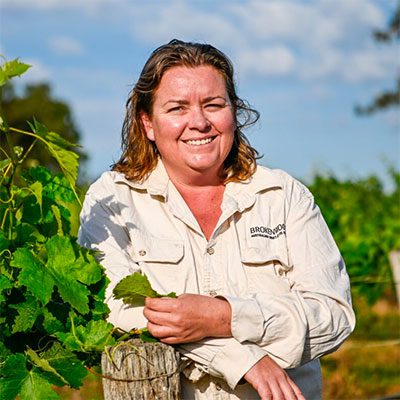Tell us in a few sentences about your experience as a viticulturist, how did you arrive here?
I’ve been working the Vineyards here at Brokenwood since I was basically 12 years of age, so for over 25 years now. I worked alongside my dad, Keith Barry (KB) who was Vineyard Manager here at Brokenwood for over two decades and was involved in planting the original Graveyard Vineyard site in 1968.
He basically taught me everything I know, and I’ve taken the baton to continue his legacy, managing the site with sustainability as a core value.
Why did you decide to apply to be an EcoGrower, was there something specific that influenced your decision and/or had you attended a previous EcoVineyards session?
Brokenwood Wines is a certified member of Sustainable Winegrowing Australia, and we also attended the recent EcoVineyard workshop here in the Hunter Valley.
We saw becoming an Ecogrower as a great opportunity for us to improve our biodiversity management program & our soil health practices in the vineyard, but also gather some real data behind what we are doing & document those benefits.
Has there been a defining moment or catalyst for you to move towards more ecologically driven viticultural practices?
The bushfires of 2020 in the Hunter Valley were a big wake up call for all of us here in the region, we’ve now had two consecutive wet vintages with record rainfall events, so I think we have to attribute some of that to the changing climate. Extreme weather events such as these are something we are all going to see a lot more of in the future & we must adapt our practices & promote resilience in the vineyard ecosystem.
Can you provide a brief overview of your project ideas, and what you wish to achieve over the 3 years and why is this important to you?
We’d like to enhance biodiversity & improve soil & vine health on Graveyard Vineyard by doing the following projects:
1. Plant a native biosecurity hedge
2. Create a beetle bank, planted with various wallaby grasses adjacent to our green corridor
3. Trial using compost tea on one of our blocks & improve soil health & nutrient cycling through cover crops, compost & mulch trials.
Are you just starting to learn, or have you been enhancing biodiversity on your property and is this an extension of what you are currently doing?
We planted a native insectary corridor adjacent to a block we are planting this year and we would like to do more of this on the property.
Tell us about your hidden superpowers, something that others don’t know about you or a practice you would like to champion?
“Kat Barry is not only resilient, but she is very capable and resourceful person, such a great person to have around and will just get things done. It’s more what she can’t do with a roll of fencing wire, some pliers, and her array of tractor attachments.”
Where do you see grape growing in the future, do you feel there is an urgency to change current practices? If so, why?
Quality begins in the vineyard and each year throws up new and interesting challenges, so grape growers have to be able to adapt and change their current practices to make sure that ecosystem services are provided in a way that vines are able to provide fruit of quality into the future.
What else would you like to share with the broader EcoVineyards community, what gets you excited about the future?
Being the custodian of vines that my father spent the majority of his working life tending, certainly keeps me focused on building on his legacy. But also maintaining the pedigree of Graveyard Vineyard Shiraz is something that I’m not only very proud of but want to ensure continues into the future.

